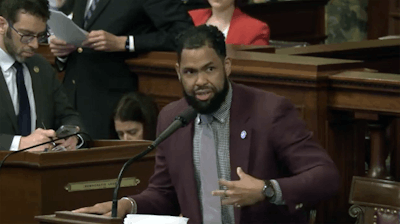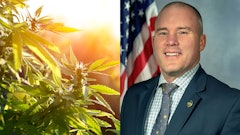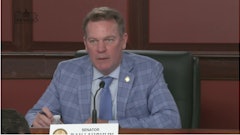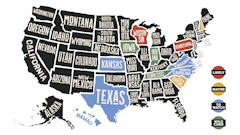
Pennsylvania House Democrats expedited an adult-use cannabis legalization bill through their chamber via a 102-101 vote on May 6 without attracting a single vote from across the aisle.
House Bill 1200, sponsored by Reps. Rick Krajewski, D-Philadelphia, and Dan Frankel, D-Allegheny, would allow adults 21 and older to possess up to 42.5 ounces of flower, 5 grams of concentrate or 500 milligrams of THC. They could also cultivate up to two mature and two immature plants at home with a $100 annual permit fee.
The legislation would also establish a regulated commercial marketplace in which the Pennsylvania Liquor Control Board would oversee state-run cannabis dispensaries, guinea-pigging such a model in the federally illegal confines of the U.S. The board would determine which municipalities could have the dispensaries, but they could not be located within 1,000 feet of a school or day care.
Meanwhile, the state would license private entrepreneurs to operate cultivation, processing, transportation and laboratory businesses.
After Krajewski and Frankel introduced H.B. 1200 on May 4, the House Health Committee that Frankel chairs advanced the legislation on May 5, and the full House passed the legislation on a second reading entirely along party lines on May 6.
UPDATE: Pennsylvania House members voted, 102-101, on a third reading May 7, officially sending H.B. 1200 to the Senate.
A divided government, Pennsylvania Republicans control a 27-23 majority in the upper chamber, meaning partisan bills such a H.B. 1200 have low probabilities of gaining floor consideration in an opposing body, much less passing.
While there wasn’t floor debate on the underlying bill on Tuesday in the House, Rep. Charity Krupa, R-Fayette, said during the previous day’s committee hearing that she was appalled by how House Democrats “rammed” the legislation through.
“At this point, this vote isn’t just about marijuana; it’s about how we govern,” she said. “By scheduling a nonvoting session on a Sunday to introduce a sweeping 173-page bill and then racing it through committee and towards a floor vote with barely 48 hours’ notice, we are undermining the legislative process itself. … This scheme is a slap in the face.”
With their Sunday introduction, Krajewski and Frankel laid out five key priorities of the bill:
- Automatically clearing criminal records and advancing restorative justice for those impacted by cannabis-related offenses;
- Reinvesting tax revenue into communities disproportionately harmed by the war on drugs;
- Implementing critical public health protections, including THC limits, marketing restrictions and child safety measures;
- Creating pathways for diverse and local entrepreneurs to participate in the regulated cannabis market, with a priority on licensing and contracting; and
- Maximizing state revenue and accountability with publicly owned and accountable retail stores.
More specifically, the legislation would cap cannabis flower at 25% total THC, concentrates at 200 milligrams of THC per package, and other products at 5 milligrams of THC per serving and 25 milligrams per package.
“We have listened carefully to public health experts, criminal justice reformers, small business advocates and community leaders,” Krajewski said. “Our bill reflects what we’ve learned—that we can and must legalize cannabis in a way that is safe, equitable and beneficial to all Pennsylvanians.”
The sponsors projected that a hybrid adult-use marketplace in the commonwealth would generate more than $500 million annually from taxes and state profits under the bill. In particular, the bill would impose a 12% excise tax on cannabis sales.
The legislation would establish a cannabis revenue fund, which, after paying for program costs, would designate 50% of the remaining money to a Communities Reimagined and Reinvestment fund, 10% to substance-use prevention and treatment, 5% to a cannabis business development fund, 2.5% to a minority business development fund and 2% to expungement processes. The remaining balance would go to the state’s general fund.
Karen O’Keefe, the director of state policies at advocacy organization Marijuana Policy Project, said there are pros and cons of the legislation.
“There are many provisions in this bill that we commend,” she said in a public statement. “It would stop criminalizing people for using cannabis and prevent families from being torn apart and lives being ruined because adults choose to relax with cannabis. However, we have serious concerns about the viability of a state-run stores model due to federal law. No other state operates cannabis businesses this way, and for good reason. State cannabis laws must be carefully crafted to ensure they are workable in the face of federal prohibition.”
Under current state law, possessing any amount of cannabis in Pennsylvania carries a misdemeanor penalty and the possibility of jail time, including up to 30 days with a $500 fine for 30 grams or less, and up to one year with a $5,000 fine for greater amounts. In 2023, Pennsylvania law enforcers arrested more than 11,000 people for cannabis possession, according to the National Incident-Based Reporting System.
Smoking cannabis in public would still carry a civil penalty under H.B. 1200, including a $100 fine on the first offense and up to a $200 fine on subsequent offenses.
The Liquor Control Board would be responsible for licensing 50 Category I cultivators for up to 125,000 square feet of canopy, 50 Category II micro-cultivators for up to 14,000 square feet of canopy, 50 Category I processors, 50 Category II micro-processors, up to 50 transporters, and additional permits for on-site consumption facilities and cannabis worker cooperatives.
Category I license applicants would be ranked and scored, with advantages awarded to certified social and economic equity applicants. Category II, transporter and consumption lounge applicants would enter lotteries designated for social equity and non-social equity applicants.
“By legalizing and regulating cannabis thoughtfully, we can avoid pitfalls that have marred rollouts in other states,” Frankel said. “Our plan will create clear rules that protect consumers, educate the public and ensure that Pennsylvania small businesses and taxpayers—not out-of-state corporations—benefit from the profits.”
While Pennsylvania Democratic Gov. Josh Shapiro has called for adult-use legalization in his last two budget addresses, he most recently proposed a 26% excise tax on sales, suggesting in February that the commonwealth is “losing out on revenue that’s going to other states instead of helping us right here.”
While the Krajewski-Frankel proposal remains partisan in the House, a bipartisan effort is unfolding in the Senate.
State Sens. Sharif Street, D-Philadelphia, and Dan Laughlin, R-Erie, introduced a bipartisan plan and circulated a sponsorship memo in February for their forthcoming adult-use legalization bill.
In Pennsylvania’s divided Legislature, Laughlin represents a pivotal peg in the legalization picture—a Republican champion for cannabis reform in the GOP-controlled chamber.



























